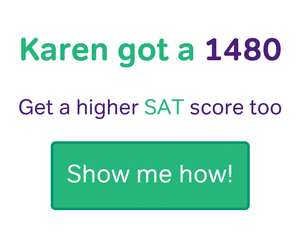If you’ve ever taken an SAT class and gotten to the reading passages, you’ve probably heard someone say it before; you may have even said it yourself. This common refrain goes something like this: I narrow it down to two answers, and I always choose the wrong one.
As a teacher, I might find it tempting to scoff and say, “That’s not true, since you always remember the times you choose the wrong answer and forget the times you choose the right one.” While there is some truth to this—our memories are very selective and fallible—there is something subtler going on: there are certain kinds of SAT trap answers that you are probably gravitating towards.
To not fall prey to these wrong answer choices, you have to be better at identifying what makes them wrong. See, the common reaction is to pick an answer choice that you have constructed an elaborate argument for. Instead of choosing the “right” answer, you should be more ruthless and find what is wrong with each of the remaining two answer choices. The one that better withstands your brutal scrutiny is the correct answer.
So what do some tempting wrong answer choices look like? Well, let’s take a passage lifted from the Magoosh product. Below are two questions with two answer choices. One of them, of course, is right. The other is the one that most students end up picking. See if you can avoid the trap!

Passages (I promise: they’re short.)
Passage 1
With social media sites, pop-up windows, and email notifications constantly vying for our attention, it is small wonder we get any work done. Even when I disable chat windows and log out of my accounts, I’m still driven to distraction: what if the chat windows open suddenly, should I check to see if John and Sally posted their wedding photos on the latest social media site, and, oh, did I ever send that email? Indeed, the only way to get any work done seems to be away from the computer. Though that’s the rub—which office employee actually does work while not seated in front of a computer?
Passage 2
If you find yourself surreptitiously logging in to social media sites, you are not alone. One report found that over 70% of office workers access a social media account at least once during the course of the day. While such wayward activity may seem cause for concern, another study found that those who log into social media sites are actually more productive than those who abstain from such behavior. One theory is that employees recharge their batteries, so to speak, when they allow themselves a few minutes here and there on social media sites, returning to their work reinvigorated. By contrast, those who do not allow themselves any such indulgence, lose focus by fixating on one task for too long.
Can you avoid the trap?
In the context of worker productivity, how would the author of Passage 2 regard the example of “John and Sally”?
(A) As a distraction that helps productivity only in the long run
(B) As a diversion that in of itself does not preclude work
First off, notice the language in the second answer choice: it’s much more technical. And note the language in the first answer choice: it’s inviting. Clearly, the passage is about the distractions, and “John and Sally” on Facebook are pretty distracting. But look carefully. What’s the answer choice say at the very end: “only in the long run”. The author of passage 2 is saying that distractions help people recharge their batteries during the day. So the focus isn’t “the long run”. Sure, it may help in the long run, but it definitely helps in on a day-to-day basis.
The second question substitutes a less common word, “diversion” for a more common one, “distraction”, while adding the very SAT-ish word preclude, which means prevent. Once you decode all that, (B) is the answer.
So what’s the lesson here? Look at the complete answer choice not just as the friendly, inviting parts. That is not to say always be wary of straightforward phrasing, but know that often there is some subtle wording in the answer choice that makes that answer wrong. I call this the “rotten spot”. Much as when you hold up a fruit for inspection, you look for the rotten spot, not what makes the fruit look appealing. The analogy, then, is that the tempting parts of the answer choice are like the bright orange-y parts of the orange. You want to make sure you turn over the entire orange in case there are any rotten spots lurking there (“only in the long run”).

Another question … can you avoid the trap in this one?
One way in which Passage 1 differs from Passage 2 is in that it
(A) relies on personal anecdote
(B) poses a rhetorical question
The first one seems right on target. The first paragraph uses the personal pronoun, “I”. But an “I” an anecdote does not make. There has to be an actual story there. Here we only get hypothetical situations (“John and Susie” are just generic names). With (A), though, it is easy to convince yourself that the various examples given, “did I ever send…email”, “the chat window opens” make for an anecdote, despite the fact that these are just vague generalizations and not an actual story. What we tend to do with (A) is convince ourselves that it is right by marshaling together a few facts. Instead, we should try to disprove it, something along the lines, “The first passage is NOT an anecdote, because…”. You’ll find that it is a lot more straightforward to disprove that the first passage is an anecdote.
The problem—and something you have to be on the look out for—is that convincing ourselves of something, e.g., the first paragraph is an anecdote, uses a lot of brainpower and therefore it is harder for us to “let go” of that answer so we can disprove it. So again, don’t look to back up the two remaining answers but to disprove them. If you eliminate both, then you’ve been a little too picky—which can happen. But with practice, you should be able to start picking the correct answer through disproving.
One final—but important—tidbit
A good way not to get caught up convincing yourself that a wrong answer choice is correct is the following: Whenever you are unsure about two answer choices, remember that the answer ultimately lies in the passage. All too often, students want to go back and forth between the answer choices without consulting the passage.
Even when students do go back to the passage, they tend to read the passage so that it conforms to the answer choice that they are leaning toward. It is better, as soon as you are stuck between two answer choices, to go directly back to the passage to hunt for the answer and think, using your own words and not the words in either answer choice, what the passage is actually saying.






Leave a Reply